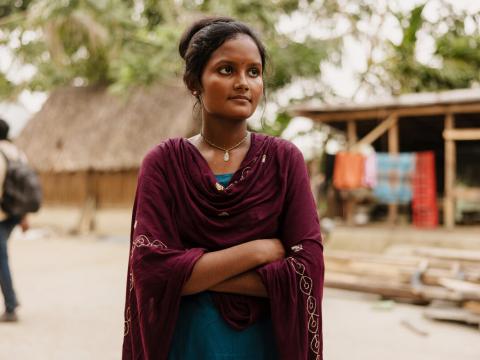Girls married off to reduce financial burden

Farah was 14 when her parents told her she was going to be married.
She and her family live in Wazirpur, a coastal area full of rivers, canals, and dams with narrow, unpaved roads winding between them. Many people earn a living through subsistence farming, carting goods on three-wheel carts, day labouring, or fishing.
They were struggling to provide for Farah and her younger sister and brother when the COVID-19 pandemic hit and work delivering goods for her father, the family’s sole breadwinner, dried up. They believed it was the best option for the family to have one less mouth to feed.
In their community, poverty levels are high and girls are often seen as a burden, not a blessing. Although things are changing, girls’ education can still be considered a waste of money because they are expected to leave their families and get married — not to work and support their families like boys. Despite this, many girls dream of a different future, and like many other girls in Bangladesh, Farah was in school at the time of her marriage and focused on becoming a nurse one day.
In Bangladesh, approximately 51% of girls are married before their 18th birthday and 22% are married before the age of 15. Child marriage is more common in rural areas where 60% of girls are married before age 18, compared to 55% in urban areas. The minimum legal age for marriage in Bangladesh is 18 years for girls; however, the Child Marriage Restraint Act 2017 includes a loophole where a court can allow child marriage in ‘special cases’. Underlying drivers of child marriage include poverty, lack of education opportunities, family honour, violence against girls, sociocultural and gender norms, and adolescent pregnancy.
Farah was devastated at the news that she’d be forced to drop out of school and go live with a husband and his family, 40 km away.
The wedding was barely finished when the abuse from Farah's new husband and in-laws started — name-calling, humiliation, and threats. She called her parents, miserable, but they told her to make the best of it; they had invested their few savings into paying her dowry. But Farah only became more and more desperate. After more calls and one month, Farah's mother arrived to take her back home.
Farah is relieved to be home again, and able to go back to school. But not everyone welcomed her back. Many of her neighbours laughed at her or told her she should be ashamed. Though dowries are now illegal in Bangladesh, they are still common in many rural areas like Wazirpur, and a girl’s family is expected to give the groom’s family money, livestock, or household goods when she gets married. The amount expected increases as the girl gets older or if she is divorced. As a result, child marriage is widespread in the community. Girls as young as 12 are married off to reduce the financial burden on their families.
Farah is still rebuilding her life. She is in grade 10 and working hard to finish school so she can pursue her career. Financial independence is even more for her important now because being divorced and no longer ‘pure’ means her parents would be expected to pay a much higher dowry if she were to remarry. She is also working with the child forum in her community to help stop other girls from being forced into child marriage. She speaks at the Village Development Committee meetings and talks to parents whenever she can, explaining her experience, the harm child marriage has on girls, and how Bangladesh law protects children’s rights and prohibits child marriage.